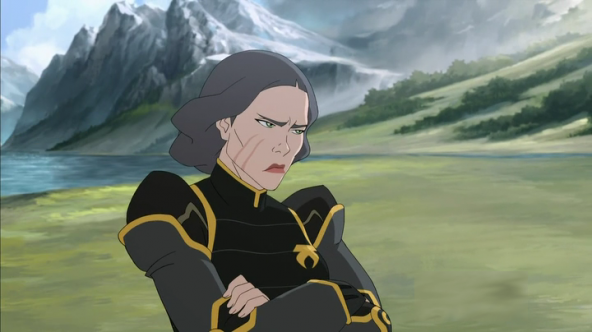The Legend of Korra: Book of Change – 04-05 Review
 A nice reminder why Lin Beifong has been one of the more interesting characters since Season 01 of Legend Of Korra.
A nice reminder why Lin Beifong has been one of the more interesting characters since Season 01 of Legend Of Korra.
Legend of Korra really seems to progress at a breakneck-pace this season. And it really shows how meandering the last two seasons have been that this fast-paced season is all the better for not being paced like the previous seasons (so far at least…). Also, I wonder if Korra trying to deal with a new airbender in some exotic place will be the setup for all the episodic stories in this seasons until the finale comes rolling around. There’s nothing wrong with that and the start of this Metal Clan arc looks promising but at some point it has to start looking foolish to find and recruit new airbenders just via Korra finding them, right?
Review:
This is exactly what I want from an hour of Legend of Korra! These were two great episodes! I’m a little bit concerned how the series will try to resolve the villains’ plot but overall this was a solid endeavor in showing Korra’s adventures as the Avatar.
The first episode is basically the end for the Ba-Sing-Se-arc. And the best thing about this finale is how fast-paced it is. This story of Kai being captured and being thrown into some sort of brainwashing/military-camp could’ve become a story for a couple of episodes. Especially, since his scenes also had a nerdy guy and such a character would’ve been perfect fodder for a short, cheesy story-arc. It would’ve been all about Kai protecting the guy against the tyranny of the despotic captor and trainer, while learning some valuable lessons. It would’ve been a very predictable and typical move for the series to dwell on this for the sake of developing Kai into a “good person”.
What this series does instead, is to go for a rather quick resolution. And the episode is all the better for it. Even more than just bringing this arc to an end, there’s a very pragmatic pacing to how this arc developed and ended. Despite the fact that there were potentially like three storylines happening at once, the plot dealt with them in a structurally utilitarian way. Because of that, this arc never had this chaotic moment where it felt like everything was happening at once. Bit by bit it set up events that were showed in a specific order without interfering with each other despite the fact that were maybe happening simultaneously. In the same way, the finale found ways to resolve the sub-plots quickly so that there was enough narrative room for the finale of this arc.
So what then follows are a very focused, goal-oriented 15-or-so minutes for this finale. There’s a clear problem with Kai being a prisoner of the Earth-Queen along with the other air-benders and the good guys are working hard to save him. And there’s some great plot-work being done here as it references back to the first Avatar-series by going first to the prison that’s under the lake. That’s the kind of reference where previous world-building is used to make a world come alive. Even though, that place ultimately turns out to be a waste of time, it’s important to show that this place still matters and is as noteworthy as it was the first time around it was mentioned (and became a thing for a couple of episodes).
Another thing that doesn’t become a real topic: Kai. Look, I don’t like the character so I don’t bemoan his lack of importance in this arc but it certainly is strange that there’s no real redemption for him. Sure, he occasionally protected a weak-looking dude during practice and when he was saved he wasn’t being a total dick about it. But it doesn’t feel like he has become a different (or even better) person after he was caught for foolishly stealing from some dude. There’s no clear character-arc for Kai in this chain of events. Maybe he will find his enlightenment later but it’s strange to end this arc with a happy end where Kai hasn’t learned to be a better person in a more direct way.
It’s also great how the series keeps its focus on the action and while mentioning the legitimacy of the Earth Queen training the airbenders in such a draconic way, the episode doesn’t start some sort of silly debate about it. The morality of ‘Team Avatar’ is always kept very clear and the clarity of their intentions also gives the plot a very efficient feeling as the airbenders are saved and the Earth-Queen defeated. The creators behind Legend of Korra always had a talent for selling little silly moments as funny and having the tyrannical Earth-Queen be allergic of all kinds of animal-hair is a nice touch to lighten up the mood. After all, we’re still talking about a queen who imprisoned innocent people in order to brainwash them and turn them into soldiers. Considering how dark you could make such a story, Legend of Korra found a very balanced way to address this in a show that’s also for children.
The fifth episode is the most important episode for the series’ plot up-to-date, I would say, because it sees Korra making an important choice. It’s only now that Korra learns about the team of supervillains that’s out to hunt her down and now she can either go search protection or… what? That ‘what’ is an important factor here. This episode makes it sound like it was either going back to Republic City for protection or continue to search new airbenders but I feel like this was more a plot-choice than a story-choice. In the end, Korra’s choice is to commit to her ideals, despite the danger that puts her in. But it isn’t like this is the only legitimate option at that point. Even from a storytelling-perspective, you could easily create a narrative around her coming back to Republic City at this point. Or how about she turns away from her mission and aggressively starts hunting the supervillains (instead of waiting for the day when they will find her)? This story and the plot could’ve gone into a bunch of directions at this point and it will be interesting to see how the series’ choice will pay off in the end.
What this series goes for instead with the fifth episode is a VERY emotional affair. But more than being emotional, it’s one that’s perfect at setting up emotional issues adults would have in a way that doesn’t expect the audience to be adults as well. I’m all for making children-shows deep and complex enough to be watched both by adults and children but it requires VERY smart writing. Rick & Morty (still one of my favorite Western cartoons from the last year or so) veers more towards having an adult-audience for example and South Park… is South Park.
Legend of Korra, though, really finds the sweet spot here between showing Korra not understanding the depth of Beifong’s issues and Beifong indirectly showing just how important her history with her sister is emotionally when they interact. And while there’s some drama going on with the way things are going with Beifong and her family, the episode never veers into soap-opera-territory. Cleverly the focus is on Korra trying to solve the problem instead.
And the same way the first idea to save Kai in episode 04 wasn’t a sure success, Korra’s first idea to get the new airbender-girl to talk with Beifong wasn’t a success either. This way of showing characters trying to do something and failing while still having a second chance is a rather realistic portrayal. Normally you have a story with a hero magically finding the solution and thereby saving the day. Or the hero fails and everything goes to shit. This realistic perspective of doing something, failing and then being able to do it again is something that fictional stories rarely tackle.
It’s a rather standard arc to let Korra land in some place that a character in her retinue is connected to and now she has to deal with that character’s past and its consequences. For an episodic arc it’s a typical setup, but it’s noteworthy how the side-character in question is an actual adult. Animes rarely put adult characters into such a spot. They just create a bland ensemble of teenagers for that purpose most of the time. But you see the advantage of having the adult in such a position here as the arc doesn’t have to revolve around annoying angst or weird emotional issues. So the story can focus on the actual character instead of fabricating existential drama.
That certainly was a good start for this Metal-Clan-arc and there are two sides to every story, of course. And I REALLY hope that Beifong isn’t stopping herself from mentioning any sort of information she should’ve shared with the group from the start.
Episodes-Rating: 4th Episode 8.0/10 5th Episode 8.5/10
Random Thoughts:
- Opal, the new airbender introduced in episode 05, really feels like a mild version of a moe-ified anime-girl. Well, maybe it’s all just an act and she turns out to be a sadist or something. Otherwise she can get in line behind Kai in terms of “new characters that I think are kinda ‘meh’ ” in this season.
- It’s nice to see how the supervillains gradually find out where they can find the Avatar. It would’ve been easy to use some bullshit-magic or just pure chance to facilitate a confrontation between Team Avatar and the supervillains but the latter are actually smartly working their way towards the Avatar.
- Bolin is interested in Opal and Opal is kinda interested in Bolin. Well, considering that all the previous romantic relationships of Bolin have been kinda doomed affairs, I’m not sure that this relationship will have a happy end.
- Speaking of relationships… I’m really happy about how Mako mostly stays in the background this season. At this point, I’m more than happy with the story showing how Asami and Korra become good friends instead of dealing with the soap-opera-drama that is Mako.
Posted on July 12, 2014, in Anime, Reviews, The Legend Of Korra: Book Of Change (S03) and tagged Anime, Avatar, Book Of Change, cartoon, Legend Of Korra, reviews, Season 03. Bookmark the permalink. 2 Comments.


















When Lin’s sister mentioned how she and Lin fought for their mother’s (Toph) affection, I was reminded of some of the family dynamics between Tenzin, Kya, and Bumi. It seems a bit cheesy, adults having beef with their siblings (even middle aged ones) about unequal bestowal of parental affection… I’m an only child, so I wouldn’t know. But, my mother has mentioned to me some of the rivalry she felt with her sisters for their parents’ love, and it seems to be a huge part of a person’s life.
Cheers to Legend of Korra for dealing with these kinds of issues. Jealousy and rivalry between siblings is something that real people feel, and I appreciate that Korra deals with these kinds of relevant feelings more than it does, say, with the overwhelming responsibility one would feel as the ultimate hero of the human race (not relevant to most viewers).
Sibling rivalry (Tenzin and sibs), unrequited love (Bolin), when people you care for do crappy things (Kai’s chara), and how to deal with girlfriends/boyfriends who have overlapping love interests (Korra and Asami), etc – those types of themes are worthwhile to explore, especially considering the teen/pre-teen target audience.
I just wish it wasn’t so formulaic. I mean, it’s not subtle AT ALL. At this point, I think focusing on Korra’s superhero-stuff, fight scenes, and believable villains – and making the relatable, family-values stuff subordinate – would do a lot to save the series. After all, I think that is one of the biggest differences between Avatar and Korra; the first focuses on the story, while the second focuses on the message.
LikeLike
> I just wish it wasn’t so formulaic. I mean, it’s not subtle AT ALL.
Yeah, you’re right, but this is still show aimed at kids. And the philosophy in Western cartoons is to err on the side of caution when it comes to portraying complex issues in kid-shows. They really want that audience to ‘get the series’.
Otherwise you have stuff like Tim Burton’s Batman movie from 1989, I mean, just imagine how many 12-year-olds have watched this movie with their parents and naturally didn’t get any the the Hitchcock-movie-references. That sort of stuff goes over the heads of the children-audience and yet it’s an important part of the film that should be experienced by the audience.
So I think I know where this philosophy of “dumbing down” comes from. And I know, the greatest children’s-book-authors most of the time have found elegant ways to make a story talk both to the children and the adults but not every writer has such a masterpiece in him/herself.
But that this stuff is even there is already a good step in the right direction when it comes to kiddy-show-writing.
> At this point, I think focusing on Korra’s superhero-stuff, fight scenes, and believable villains – and making the relatable, family-values stuff subordinate – would do a lot to save the series.
Well, this season hasn’t done anything TOO stupid with its plot yet but you gotta remember… Creating an effective overarching plot-structure has never been one of Legend Of Korra’s strong suits. Legend Of Korra always likes to be ‘in the moment’ with its plot.
When Lin Beifong caught up with Korra to tell her about the supervillain-team and that she needs protection, my first idea was for Korra to turn away from her search and create a trap with herself as bait in order to confront these supervillains. But then the good fifth episode would’ve never happened and it would’ve become a total action-spectacle, I guess.
> After all, I think that is one of the biggest differences between Avatar and Korra; the first focuses on the story, while the second focuses on the message.
Yeah, Korra doesn’t have that plot-driven story where the Avatar needs to save the world. Rather, Korra needs to deal with various social, spiritual and whatever issues in each season. Hmm, makes you wonder whether it was the right choice to make Korra such a hotheaded character
LikeLike